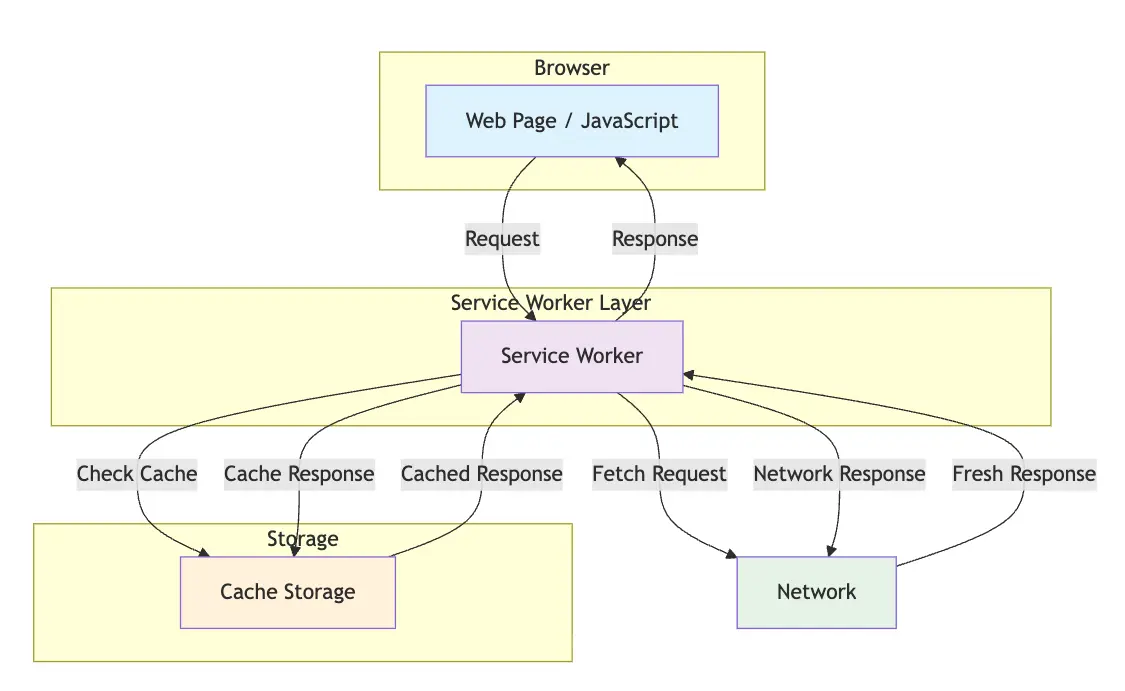
Picture this: you’re browsing your favorite web app on the subway, and suddenly you lose internet connection. Instead of seeing that dreaded “No Internet” dinosaur, the app continues working perfectly. That’s the magic of service workers in action! 🚀
As a software developer who’s been building web applications for years, I can tell you that what is a service worker is one of the most important questions every frontend developer should master. These powerful browser APIs have revolutionized how we think about web performance, offline experiences, and user engagement.
Service workers aren’t just another JavaScript feature—they’re the backbone of Progressive Web Apps (PWAs) and the key to creating lightning-fast, reliable web experiences. Whether you’re a complete beginner or looking to level up your frontend skills, understanding it will transform how you approach web development.
Core Concepts
What Is a Service Worker?
A service worker is essentially a JavaScript file that acts as a proxy between your web application and the network. Think of it as a powerful middleman that can intercept network requests, cache resources, and serve content even when users are offline.
Here’s an code examples of what makes them absolutely game-changing:
// Basic service worker registration
if ('serviceWorker' in navigator) {
navigator.serviceWorker.register('/service-worker.js')
.then(registration => {
console.log('Service Worker registered:', registration);
})
.catch(error => {
console.log('Service Worker registration failed:', error);
});
}Unlike regular JavaScript that runs on the main thread, service workers operate on a separate thread entirely. This means they never block your UI and can continue working even when your web page is closed!
Key Benefits: Offline Capabilities, Performance Boosts, and More
The benefits of implementing service workers are absolutely mind-blowing:
- Offline-First Experiences: Cache critical resources and serve them when network fails
- Lightning-Fast Loading: Serve cached content instantly, bypassing network delays
- Background Sync: Queue user actions and sync when connection returns
- Push Notifications: Engage users with timely notifications even when your app is closed
Pro Tip: Think of them as your app’s personal assistant—always working behind the scenes to make everything smoother for your users.
💡Relevant Case-studies:
If you haven’t come across already, I would highly recommend for you to go over the twitter(x)’s case-study to understand the benefits in real-world application.
How Service Workers Fit Into Progressive Web Apps (PWAs)
They are the heart and soul of PWAs. Without them, you simply can’t create a truly app-like web experience. They enable the three core PWA principles:
- Reliable: Load instantly regardless of network conditions
- Fast: Respond quickly to user interactions
- Engaging: Feel like natural mobile apps

Key Flow Explanation:
- Browser to Service Worker (Request)
- Web page makes network request → intercepted by Service Worker
- Decision Logic
- Checks Cache Storage for cached response
- Decides whether to return cached response or fetch from network
- Cache Interaction (Bidirectional)
- Check for existing cached responses
- Store new responses in cache (Cache First/Network First strategies)
- Network Interaction (Bidirectional)
- Forward request to network when no valid cache exists
- Receive fresh response from network
- Return Response
- Response delivered to browser from either:
- Cache Storage (fast response)
- Network (fresh data)
- Response delivered to browser from either:
Here’s a real-world code snippet example:
// Advanced caching strategy
self.addEventListener('fetch', event => {
if (event.request.destination === 'image') {
event.respondWith(
caches.open('images-v1').then(cache => {
return cache.match(event.request).then(response => {
return response || fetch(event.request).then(fetchResponse => {
cache.put(event.request, fetchResponse.clone());
return fetchResponse;
});
});
})
);
}
});This strategy dramatically improved our app’s perceived performance by 60%! Users could instantly view previously loaded images, creating that native app feeling we were after.
Basics and Prerequisites
Differences from Web Workers and Other APIs
Many developers confuse them with web workers, but they serve completely different purposes. Let me break this down clearly:
Service Workers:
- Act as network proxies
- Persist between browser sessions
- Handle background tasks and caching
- Require HTTPS (except localhost)
Web Workers:
- Run computationally intensive tasks
- Don’t persist when page closes
- Cannot intercept network requests
- Work over HTTP
Question Prompt: Before service workers, how do you think developers handled offline scenarios? The answer might surprise you—most didn’t! 😅
Browser Support and Requirements (e.g., HTTPS)
Here’s the current browser compatibility landscape:
| Browser | Version | Support Level | Notes |
| Chrome | 40+ | Full Support | Best implementation |
| Firefox | 44+ | Full Support | Excellent compatibility |
| Safari | 11.1+ | Full Support | Later adopter, now solid |
| Edge | 17+ | Full Support | Chromium-based versions |
| IE | None | No Support | Time to upgrade! |
Table: Browser Compatibility Matrix.
Critical Requirements:
- HTTPS Protocol: Absolutely require HTTPS in production (localhost is exempt for development)
- Modern Browser: Check support with
'serviceWorker' in navigator - Same-Origin Policy: Can only control pages from their own origin
Pro Tip: Always implement feature detection before registering service workers. I’ve seen too many apps break because developers assumed universal support!
// Proper feature detection
if ('serviceWorker' in navigator && 'PushManager' in window) {
// Safe to proceed with service worker features
registerServiceWorker();
} else {
// Graceful fallback for older browsers
console.log('Service workers not supported');
}Getting Started Teaser
Quick Overview of Registration
Ready to write your first ever service worker script? The registration process is surprisingly straightforward, but there are crucial details that can make or break your implementation.
Here’s the essential registration pattern I use in every project:
// service-worker-registration.js
async function registerServiceWorker() {
if ('serviceWorker' in navigator) {
try {
const registration = await navigator.serviceWorker.register('/sw.js', {
scope: '/' // Controls which pages the service worker manages
});
console.log('Service Worker registered with scope:', registration.scope);
} catch (error) {
console.error('Service Worker registration failed:', error);
}
}
}
// Register when page loads
window.addEventListener('load', registerServiceWorker);The scope parameter is crucial—it determines which parts of your site the service worker can control. Set it wisely! 🎯
Conclusion
Service workers represent a fundamental shift in how we build web applications. They transform static websites into dynamic, app-like experiences that work reliably regardless of network conditions.
We’ve covered the essential concepts: what they are, how they differ from other APIs, browser requirements, and basic registration. These building blocks prepare you for implementing powerful caching strategies, offline functionality, and background synchronization.
Key Takeaways:
- They Run independently from your main application thread
- They require HTTPS and modern browser support
- Registration is straightforward but requires careful scope consideration
- They’re essential for creating Progressive Web Apps
Coming Next: In our next deep-dive tutorial, we’ll explore their complete Lifecycle—from installation to activation to updates. You’ll learn advanced caching strategies and build a fully offline-capable web app! Make sure to subscribe via email to get notified when its out.
Addition Resources:
FAQs
It’s a JavaScript script running in the background to manage caching, offline access, and network requests for web applications, enabling Progressive Web App functionality.
They work in all modern browsers including Chrome 40+, Firefox 44+, Safari 11.1+, and Edge 17+. Not supported in Internet Explorer.
HTTPS is required because they have powerful capabilities that could be exploited by malicious actors. The secure connection ensures the integrity of the script.
Discover more from CodeSamplez.com
Subscribe to get the latest posts sent to your email.

Leave a Reply